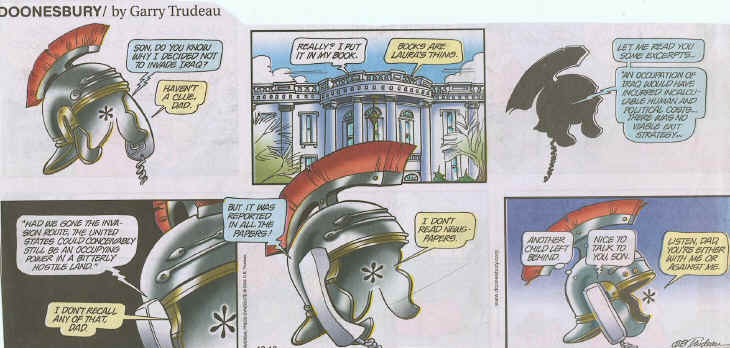Editor’s Note: This was
my last article prior to the 2004 election. At this point, the two candidates
were running neck-and- neck. Like most highly partisan types in this polarized
time, I can’t seem to understand how anyone could vote for the guy I’m voting
against. I know it’s not just stupidity, but I have to keep reminding myself of
this fact, because the choice this year seems so obvious that I can’t imagine
how this country could be split 50-50. Actually, one of the main reasons for
writing this article was that I wanted to find a place for two of my favorite
quotes, penned by two of my favorite humorists: Mark Twain and George Carlin.
Keep It Simple, Stupid
|

|
|
Needing a little extra income, I’d
hoped to run for some minor political office in November, but I’ve realized I can’t.
Editorial writers leave a paper trail of obnoxious opinions, and it’s hard to
claim you’ve been misquoted when it’s all there in black and white.
Articles that support gay marriage, burning
the American flag and legalizing marijuana don’t exactly comprise a
winning platform. I can imagine an opponent reducing each column I’ve
written to a 10-word sound bite and using it against me.
|
Perhaps my situation — as Mark Twain said of Wagner’s
music — “is not as bad as it sounds”: To elucidate them fully, most
controversial topics require all of the 800 or so words the newspaper allots me.
Writing op-ed pieces has taught me how hard it is to discuss the subtleties of
most subjects in under a thousand words. Few issues are as black and white as
politicians would like to pretend.
But, as John Kerry has discovered, campaigns are difficult
venues for explaining the nuances of most subjects. Kerry’s problem is that he
sees complex issues in depth and tries to explain the intricacies of his
positions. This enables his opponents to paint him as abstract and wishy-washy
and contrast him unfavorably with Mr. Bush, the perfect sound-bite candidate,
who sees most world events simply as “with us or against us” and good
vs. “evildoers.”
For example, Republicans characterize Kerry’s record on the
Iraq war as flip-flopping. When he voted for the resolution giving the president
authority to go to war, he made it clear he supported a “multilateral
effort” to deal with Saddam and the elusive WMDs that Mr. Bush was touting.
Giving a president the power to go to war is not the same as approving a
particular invasion. At the same time, he has consistently called himself an “anti-war candidate,” because he’s believed right along that Mr.
Bush took us into Iraq prematurely, unnecessarily and without a plan for the
aftermath.
However, the electorate has difficulty holding two disparate
thoughts in its head simultaneously, which is why Republicans are able to float
the idea that anyone who’s against the war must be for Saddam
Hussein. During the GOP’s daily campaign commercial, “The No-Spin Zone,”
Bill O’Reilly said precisely that to filmmaker Michael Moore. Despite his
insistence that Saddam “deserves a special place in hell,” Kerry has
been tarred with the same brush: If you’re not with us, you’re against us.
The Bush campaign has done the same thing with Kerry’s $87
billion appropriations vote, intoning endlessly about how he voted for the money
before he voted against it. But Kerry supported a bill that would have been
funded by rolling back tax cuts for rich Americans, whereas he voted against the
Republicans’ revision, which added the war debt to already-astronomical Bush
deficits. Not quite the same thing.
Right after the first debate, GOP campaign ads jumped all over
the phrase “global test.” At the time, Kerry had explained what he
meant in detail, but the GOP ascertained that the nuances of this concept were
too complicated for the average American, so they wasted no time disingenuously
misrepresenting what Kerry had said. In anything other than a political
campaign, this would be called “hypocrisy.”
Bush’s mind-set is perfectly suited to politicking,
where the tone is established by 30-second commercials written by admen more
comfortable selling Pepsi than discussing complex issues in depth. With short
attention spans and an ever-increasing hunger for smaller and smaller sound
bites, Ritalin-soaked Americans are the perfect audience for simplistic
thinking. Politicians count on it.
Laura Bush’s defense of her husband’s opposition to
stem-cell research was an especially egregious example of hypocrisy. While hewing
slavishly to the
Religious Right’s hard-line position, Mrs. Bush’s sweet appearance and soft
voice give a compassionate-conservative gloss to restrictions that are hampering
progress in the field. Style aside, this is standard Republican dishonesty.
Laura said that W is the only president who’s ever authorized funding for
stem-cell research. How stupid does she think we are? Stem-cell research barely
existed prior to 2000, so it’s no wonder Jimmy Carter and Dwight Eisenhower
never funded it. Bush is also the only president ever to restrict
it.
Unfortunately, recognizing this hypocrisy would have required
some sense of history, and we Americans don’t have much patience with that.
That’s why our president could explain that millions of Arabs hate us simply
because “they hate our freedoms” … as if there were no historical
reasons why people in the Third World might resent the West. But his
world view is simplistic and succinct and sounds profoundly patriotic.
Nuanced explications sound weak and conciliatory — like
changing your mind when realities change. We prefer our leaders rigidly
resolute, even when they’re resolved to lead us over a cliff or into a
quagmire.
Comedian George Carlin once quipped, “The average
American is a moron, and, by the definition of ‘average,’ half of us are
even stupider than he is.” Overly cynical and nasty? Probably. But, come
Election Day, we’ll see if it might also be just a little bit true.
Click here to return to
the Mark
Drought home page.

